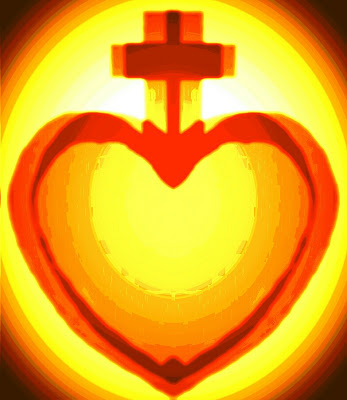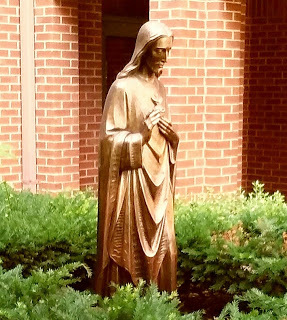"All You Who Labor and are Burdened..."
 Jesus said, "Come to me, all you who labor and are burdened, and I will give you rest. Take my yoke upon you and learn from me, for I am meek and humble of heart; and you will find rest for yourselves. For my yoke is easy, and my burden light" (Matthew 11:28-30).
Jesus said, "Come to me, all you who labor and are burdened, and I will give you rest. Take my yoke upon you and learn from me, for I am meek and humble of heart; and you will find rest for yourselves. For my yoke is easy, and my burden light" (Matthew 11:28-30).This feast day, and this way of approaching Jesus - drawn by the unimaginable depth of the love of His human heart - is a refuge for me.
For I am one of those who labor and are burdened. Illness is part of it, of course. But it's deeper; it goes down to the core of my personality. I am a large and broken person, with "the grandeur and the misery" of being human tied together in huge knots all through my soul.
There is still so much pride in me. So much ego. Much of my burden is there. But that's not all of it. There is also something that I can no longer escape at my age: it's a real undeniable pain, like a wound, like a constraint of nature: the pain of the failure to fulfill the great potential of my own life. The fact that this failure was mostly unavoidable, due to illness and uncontrollable circumstances, does not mean that it's painless. I don't let it define me. I don't dwell on it too much. But I can't pretend it's "nothing" either.
Perhaps I now embody, in some measure, the "type" of personality that I remember hearing described in my youth with reference to someone else much older, someone with vision and achievements marred by catastrophe and frustrated by the narrow space of action that confined him thereafter: "He is a marvelous wreck of a man."
I came to know that particular man well in his last years. The description was fitting, up to a point. But his limitations humbled him and opened his heart radically to his need for God's salvation - for God's mercy. This was something new and transforming, and there was "lightening" of the burden in it; he found a measure of rest and a wisdom that he tried to communicate to others.
But the burden did not go away. Sometimes it overwhelmed him. Nevertheless, he knew he wasn't carrying it alone.
And now I find myself an "elder" with achievements and catastrophe in my past, and limitations going forward in my remaining years (none of these are as great - or as terrible - as those of my old friend from my youth, who went home to God a long time ago).
Still I remain a very "large" person, with a vast span of interests and concerns, full of aspirations and frustrations, generous but proud, broken in so many ways.
I talk too much (verbally and in writing). I always have, of course, but it has become more evident even to myself. I suppose this is for the better: it's so easy to become a crashing of cymbals, a colossal wind-bag, a bore without even realizing it.
Yet people like me are terrified of being useless, of being ignored. I have a "large" pride. It's what's called a big ego. That's part of my burden, but it doesn't explain everything.
Knowledge puffs up. Others admire knowledge when it's in alliance with political or social power, or when it can otherwise serve some practical purpose. But when the "large" person is sidelined or begins to grow old - when it becomes clear to everyone that he or she is no longer a "player" in the game - admiration fades, and is replaced by a kind of deferential tolerance (at best) or contempt or (what is most feared) invisibility.
I don't want to live this way. I want to change.
I must learn to become "small," but not by reducing myself, ceasing to learn, ceasing to be fascinated by reality. Not by changing my basic personality through some strange psychic self-mutilation. Rather, I must continue to pursue wisdom and understanding, and to sustain the broad scope of my sensibility toward people and things. I cannot give up caring about life.
 All of that must remain and grow. What must decrease are the illusions of self-centeredness and self-sufficiency, the illusions of power and autonomy. And at this time of life, one is compelled more and more to give way to obviously irreversible losses and the approach (even if not yet imminent - though "who really knows?") of one's own mortality.
All of that must remain and grow. What must decrease are the illusions of self-centeredness and self-sufficiency, the illusions of power and autonomy. And at this time of life, one is compelled more and more to give way to obviously irreversible losses and the approach (even if not yet imminent - though "who really knows?") of one's own mortality.The mysterious part of our "burden" is this inescapable poverty that makes us all small in the end - the poverty of suffering and death. It will either humble us or crush us.
I'm more aware of how overgrown, misshapen, and broken I really am. A rich person (whose riches, after all, turn out to be junk) cannot pass through a needle's eye. That point of entry lies before me, and I cannot ignore that my path gets very narrow in proportion to its proximity.
Will I learn to be "meek and humble of heart"? I am frightened. The scope and weight of the burden are heavy indeed. But Jesus says, "Come."
Is it such a difficult invitation? He promises "rest" in His own measure, and it is possible to find it in Him. His burden is "light" - a seeming paradox, appropriate when we realize that He is speaking of His human heart. His human heart suffers all the brokenness that we have wrought upon the reality that He - through His divine power and wisdom and love - has created.
My large and broken self becomes small, when it is encompassed in His great, humble, Broken Heart.
Published on June 28, 2019 16:31
No comments have been added yet.



